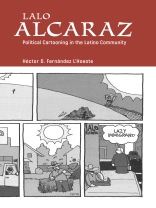Amid the controversy surrounding immigration and border control, the work of California cartoonist Lalo Alcaraz (b. 1964) has delivered a resolute Latino viewpoint. Of Mexican descent, Alcaraz fights for Latino rights through his creativity, drawing political commentary as well as underlining how Latinos confront discrimination on a daily basis. Through an analysis of Alcaraz’s early editorial cartooning and his strips for
La Cucaracha, the first nationally syndicated, political Latino daily comic strip, author Héctor D. Fernández L’Hoeste shows the many ways Alcaraz’s art attests to the community’s struggles.
Alcaraz has proven controversial with his satirical, sharp commentary on immigration and other Latino issues. What makes Alcaraz’s work so potent? Fernández L’Hoeste marks the artist’s insistence on never letting go of what he views as injustice against Latinos, the fastest growing ethnic group in the United States. Indeed, his comics predict a key moment in the future of the United States–that time when a racial plurality will steer the country, rather than a white majority and its monocultural norms.
Fernández L’Hoeste’s study provides an accessible, comprehensive view into the work of a cartoonist who deserves greater recognition, not just because Alcaraz represents the injustice and inequity prevalent in our society, but because as both a US citizen and a member of the Latino community, his ability to stand in, between, and outside two cultures affords him the clarity and experience necessary to be a powerful voice.
Om författaren
Héctor D. Fernández L’Hoeste, Avondale Estates, Georgia, is professor of world languages and cultures at Georgia State University in Atlanta. He is author of Narrativas de representación urbana: un estudio de expresiones culturales de la modernidad latinoamericana and coeditor of Rockin Las Americas: The Global Politics of Rock in Latin/o America; Redrawing the Nation: National Identity in Latin/o American Comics; Cumbia!: Scenes of a Migrant Latin American Music Genre; and Sports and Nationalism in Latin/o America.












